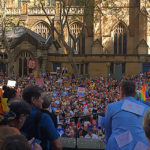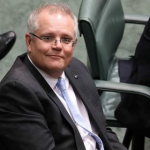Religious Discrimination Bill: Enabling Persons of Faith to Discriminate

The Coalition has released its long-awaited religious discrimination bill, making it unlawful to discriminate against persons of faith for religious statements that are offensive to others.
Many believe the Bill has been informed by the recent Israel Folau saga, and opinion is divided about whether the Rugby star would be protected by the law if it were applied to his situation.
Protections
The draft legislation includes provisions preventing discrimination against persons of faith in a wide range of areas, including employment, education, accommodation, sports, and access to goods, services, premises, facilities and clubs, whether public or private.
It means persons of faith are generally permitted to make religious statements even if they offend marginalised groups, without fear of repercussions.
In order to discriminate against persons of faith, large businesses with a turnover of $50 million or more need to prove that to do otherwise would cause “unjustifiable financial hardship to the business”.
To attract protection, religious statements must be made “in good faith” in accordance with the teachings of the particular religion.
They will not be protected if malicious, would harass, vilify or incite hatred against a group or advocate for the commission of a serious criminal offence.
Equality Australia said the act enshrined “religious exceptionalism” by giving new privileges to people of faith, while overriding existing protections from discrimination for others.
Forms of discrimination
When a workplace takes adverse action against an employee or potential employee specifically because of their religion this would be direct discrimination.
Indirect discrimination is more subtle but can also contribute to a group being disadvantaged. This comes in the form of creating workplace practices or a workplace culture which makes it harder to be a religious person, even though there may not be any direct discrimination. A workplace which condones sexist jokes or frequently holds all-male social events, could be guilty of indirect sex discrimination
Although the business might not directly refuse to hire women, the effect of these policies would be to make it more difficult to be a woman person in the workplace.
Practical effects
There are still many question marks in how the bill will be applied, or what final form it will take, with religious groups and LGBT and other activists vowing to continue lobbying the government.
The first point is that an employer’s code of conduct could not prevent employees from making statements of belief in non-work times.
While it seems that the bill came out of the Folau saga, the exemption for business that show financial hardship could mean that these laws would have made no difference. The ARU would just need to prove that their business was at risk of losing customers or sponsors as a result of controversial religious views being shared.
The proposed laws will allow religious schools the right to discriminate only on the grounds that an employee was not of that institution’s faith but would not allow them to deny employment because of age, gender or sexuality. Religious bodies will still need to abide by other discrimination laws.
The bill has a specific section allowing conscientious objections by health practitioners. This could allow individual doctors to refuse to perform a wide range of services on religious grounds, including abortion, assisted suicide and procedures for transgender patients.
In terms of indirect discrimination, the bill means that an employer needs to make sure that they did not disadvantage people of a particular religious belief, such as by requiring Jewish employees to attend a Friday afternoon meeting if they would usually leave early to observe the Sabbath.
As the bill defines religious activity quite broadly, including dress, it could be the case that an employer could fall foul if they require everyone to wear a suit rather than a religious garment, if they cannot prove that this would impact on customers.
Broken promises
In July, Porter claimed the bill was “not intended to displace state law”, responding to concerns from LGBT advocates warning it could undermine state protections against vilification.
The bill, released on Thursday, explicitly overrides Tasmania’s Anti-Discrimination Act, which prohibits statements which “offend, insult or humiliate” based on protected grounds including gender, race, age, sexual orientation, disability and relationship status.
The explanatory memorandum claims the Tasmanian law needs to be overridden “given its broad scope and demonstrated ability to affect freedom of religious expression”.
Provided a person is expressing a genuinely held religious belief in good faith, that Tasmanian provision will not apply – breaching Porter’s commitment.
Equality Tasmania spokesman Rodney Croome said that Canberra was “directly interfering to weaken a Tasmanian human rights law that protects vulnerable people”.
“A significant proportion of complaints under this section are from people with disability, so Canberra is directly weakening protections for them, as well as for women, LGBTI people and anyone else who falls foul of traditional religious doctrines,” Croome said.
Political response
The Greens have warned that the bill could be a “Trojan horse for hate,” and emphasized that they will not be supporting it in parliament.
“The far-right of Morrison’s party are still trying to get their way, chipping away at the rights of LGBTIQ+ people and other minorities,” Greens senator Janet Rice said. “Any bill that comes to the parliament must ensure all Australians are treated equally.”
The Labor party, meanwhile, has positioned itself firmly on the fence regarding the new bill, with shadow attorney general, Mark Dreyfus, saying it was too early to signal whether Labor would support the bill.
“Unlike the government, which has only been having an internal debate, Labor will be listening carefully to the whole Australian community, Labor will be consulting deeply and widely, which is what the government should be doing too,” Dreyfus said.
This basically seems like the Labor party saying that they are unable to judge the legislation on its merits and their own moral compass, needing to wait to see whether it will be popular enough for them to support.
The other minor parties have not all signalled their voting intentions. The Bill will be a bitter battle between the right wing of the Coalition and other politicians who do not want to see religious freedoms given a privileged position over other rights.






